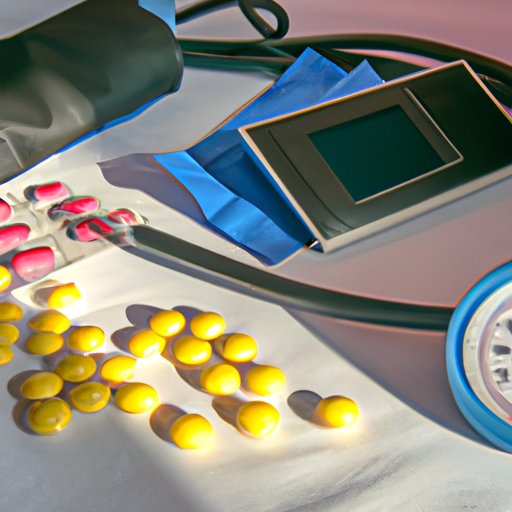
What You Should Not Take with Blood Pressure Medication
Taking medication for hypertension or high blood pressure is an important part of managing one’s health. However, it’s essential to take it correctly to avoid any risks. Mixing medications or supplements with blood pressure medicine can lead to interactions that could potentially harm your health. In this article, we’ll discuss what medications, supplements, and lifestyle habits you should avoid while taking blood pressure medication.
List of Common Medications and Supplements that Interact with Blood Pressure Medicine
Some medications and supplements that interfere with blood pressure medication include nonsteroidal anti-inflammatory drugs (NSAIDs), certain antidepressants, and herbal supplements like St. John’s Wort. These medications can increase the side effects of blood pressure medication, decrease its effectiveness, or even raise one’s blood pressure.
If you suffer from muscle soreness, it’s recommended to avoid taking over-the-counter painkillers, such as ibuprofen or aspirin, because they can cause kidney issues or stomach problems. Instead, focus on natural remedies like heat therapy or gentle stretching. Alternatively, speak with your healthcare provider about the right way to treat your muscle soreness and whether you should stop taking blood pressure medication temporarily.
Dangers of Mixing Alcohol with Blood Pressure Medicine
Mixing alcohol and medication can lead to undesired results, and it’s especially true for blood pressure medication. Alcohol can increase blood pressure, causing medication to be less effective, and lead to lightheadedness or drowsiness. Drinking too much alcohol also increases the risk for liver damage and could undermine one’s treatment plan.
It’s recommended to avoid alcohol altogether while taking blood pressure medication. If you still want to drink, consult your healthcare provider to determine a safe limit or whether you should switch to medication that does not negatively interact with alcohol.
Creating a Personalized Medication Schedule
Keeping track of one’s medication and dosage can feel overwhelming, but it’s essential to do so to avoid interactions. Creating a personalized medication schedule is an excellent way to stay organized and ensure medications are taken correctly.
Start by designating a specific time and place for medication reminders, set alarms or notifications on your phone, and use a medication planner or calendar to visualize the weekly schedule. It’s recommended to keep the medication list updated and bring it to every healthcare provider appointment to make sure there are no interactions.
Real-life Examples of Blood Pressure Medication Interactions
Interaction with blood pressure medicine can lead to severe and even life-threatening outcomes. There have been numerous cases where medication interactions have led to critical conditions, such as liver damage, seizures, kidney failure, and arrhythmia.
It is crucial to be honest with your healthcare provider and avoid getting medications without a prescription as they are likely to be counterfeit, and often with little-to-no information about their side effects.
Communicating with Healthcare Providers
Having an open conversation with your healthcare provider regarding your medication is vital. Healthcare providers are there to help you understand the pros and cons of the drugs and supplements you are taking.
During your appointment, be sure to ask questions and explain any symptoms or side effects you may experience. It’s essential to go over your entire medication list, including over-the-counter supplements and vitamins, to identify any potential interactions. Remember to listen to your healthcare provider, take notes, and follow any suggestions.
Finding Trustworthy Sources of Information
Avoid being misled by untrustworthy sources of medical information and seek information from trustworthy sources like doctor-approved websites, medical textbooks, and government health websites. Also, check with your healthcare provider before making any changes to your medication and ask for their recommendations of reliable medical resources.
Lifestyle Habits that Interact with Blood Pressure Medication
Certain lifestyle habits and diets can pose risks or interfere with blood pressure medication. Habits like consuming a high amount of sodium, being overweight, and smoking can worsen hypertension and cause medication to be less effective.
It’s important to follow a heart-healthy diet with low sodium, saturated fat, and plenty of fruits, vegetables, and whole grains. It’s recommended to quit smoking, limit alcohol intake, and get regular exercise, such as brisk walking, jogging, or swimming. By adopting healthier habits, blood pressure medication is likely to have a better impact on one’s health.
Conclusion
In conclusion, taking blood pressure medication is essential to managing hypertension and enhancing overall health and well-being. However, it’s essential to be aware of what medications, supplements, and lifestyle habits can interact with the drug to avoid potential health risks. Additionally, communication with healthcare providers on medication usage and following a personalized medication schedule can have a positive impact on one’s health. Be sure to stay informed, stay healthy, and have honest conversations with healthcare providers.





